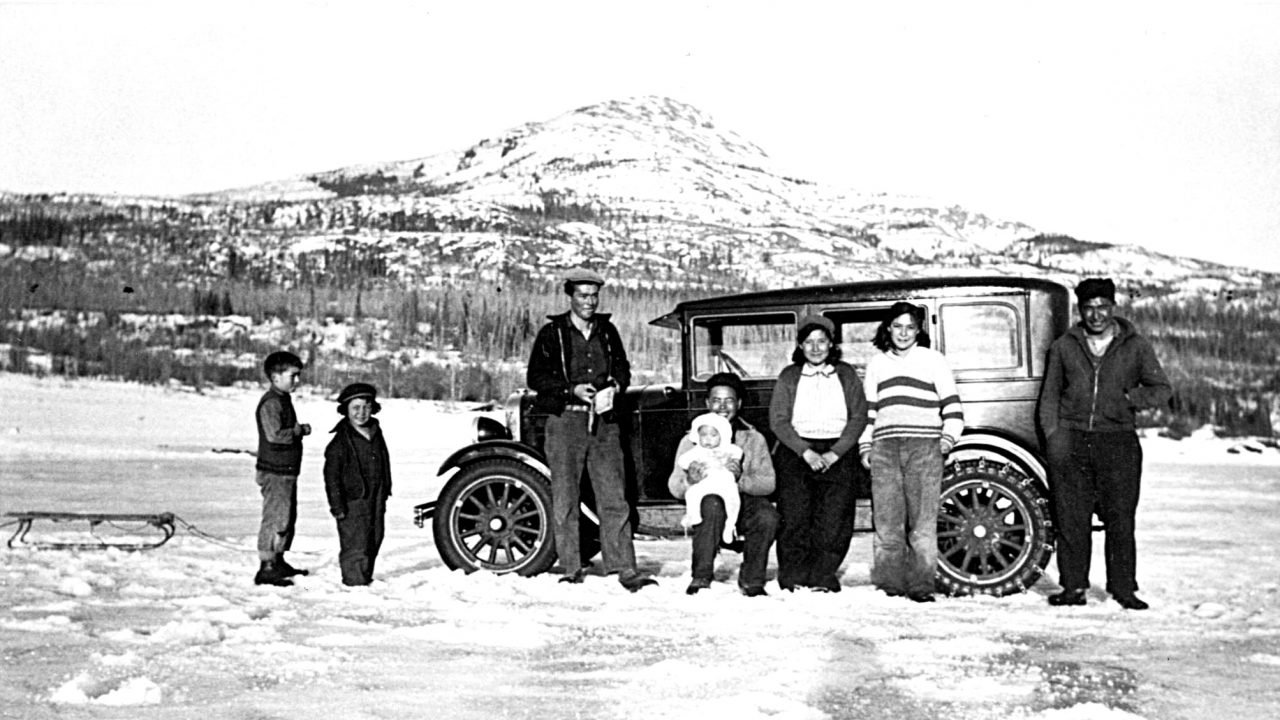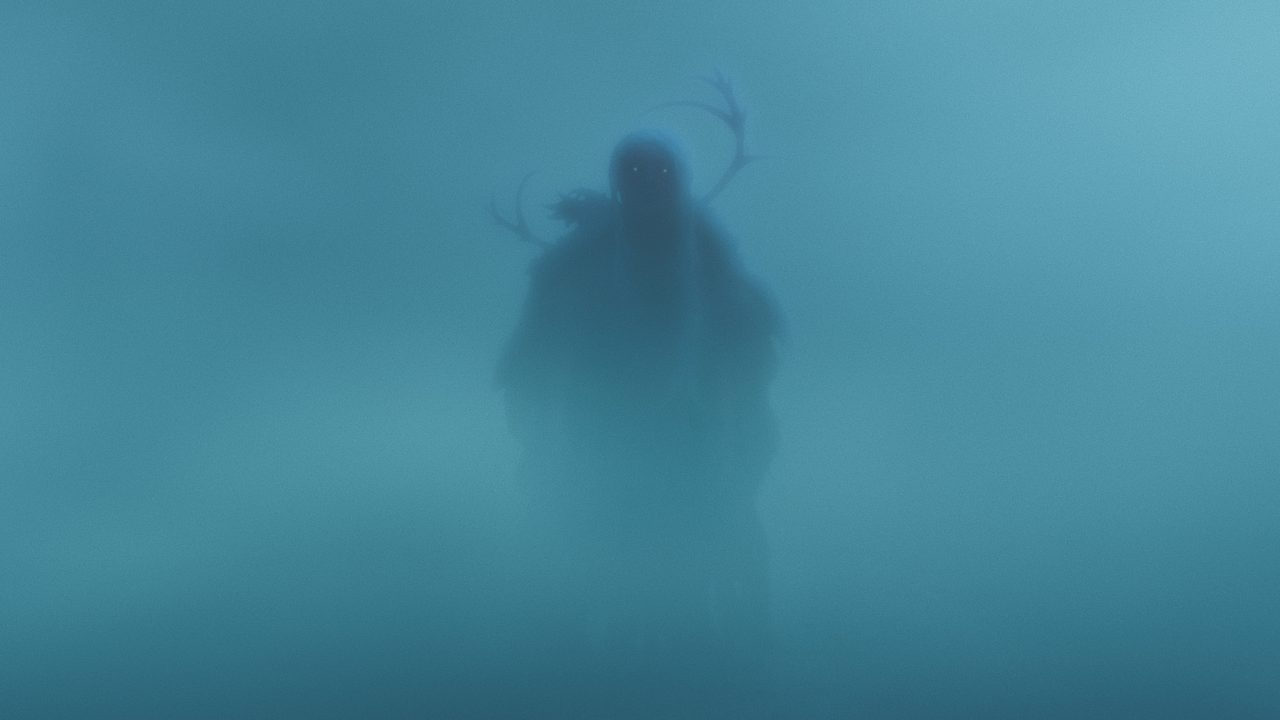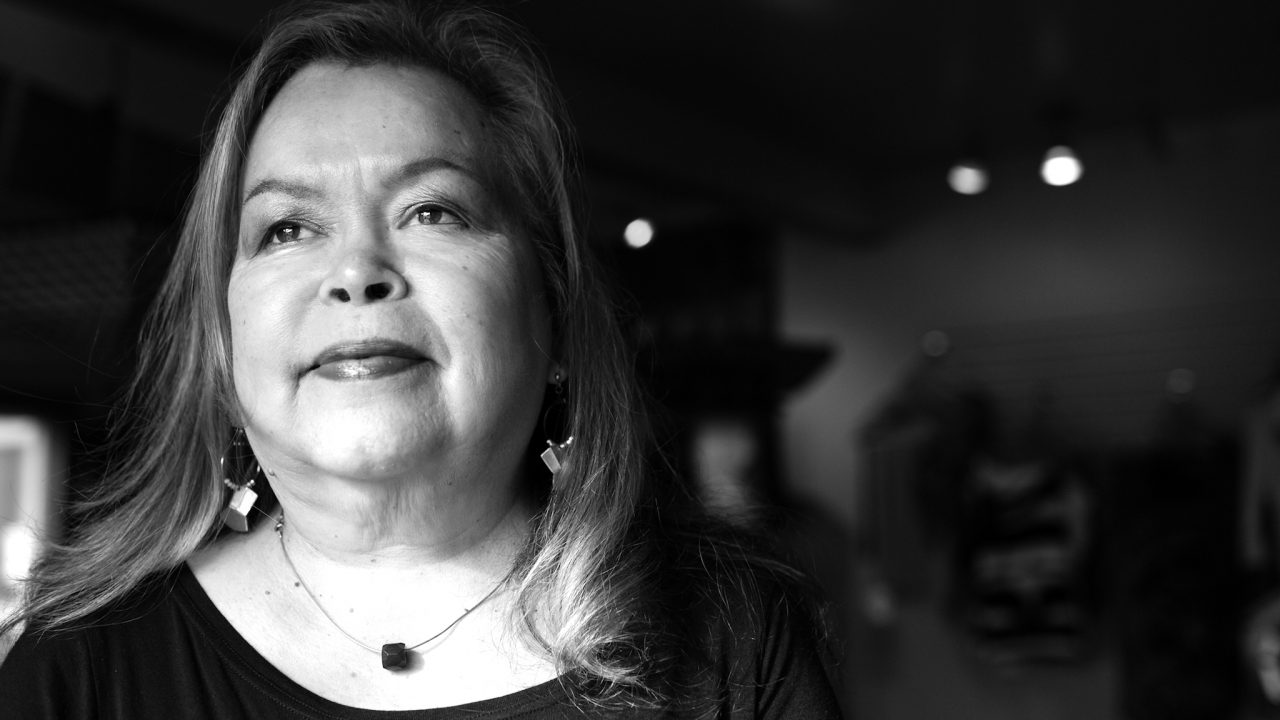
Barb Cranmer: Bak̓wam Storyteller & Wonder Sister
Barb Cranmer: Bak̓wam Storyteller & Wonder Sister
“It was important for me to get the truth out there, from our own perspective, and do it with the respect and integrity that comes from our community. That’s been a driving force for me.” – Barbara Cranmer, 1960-2019
Barbara Cranmer — visionary ‘Na̱mg̱is filmmaker and one of the most authoritative Indigenous storytellers of her generation — died on May 17 at the age of 59. Surrounded by members of her immediate family, collaborators on so many of her creative ventures, she was accompanied by 17 eagles, circling high above the hospital at the moment of her death.
One of her traditional Kwak’wala names was Lakwalogwa, which means woman who invites her people to the feast, and on May 22 hundreds gathered in her home village of Alert Bay to celebrate her life and to acknowledge the enduring mark she’d made on their lives.
A member of the ‘Na̱mg̱is Nation of the Kwakwaka’wakw, Cranmer was born to Chief Yakudɬas (Roy Cranmer) and Gwi’mo’las (Vera Newman), who both descend from long lines of distinguished Kwak’wala leaders. Her grandfather Chief Dan Cranmer left his own indelible mark on history when he hosted the famous Cranmer potlatch on Christmas Day, 1921, defying the federal anti-potlatch ban by organizing one of the biggest potlatches that ever took place on the B.C. coast.
A similar impulse — to resist erasure and proudly affirm cultural identity — would fuel his granddaughter’s long engagement with cinema. Barb’s impressive list of director credits includes Mungo Martin: A Slender Thread (1991); Laxwesa Wa: Strength of the River (1994); Qatuwas: People Gathering Together (1995); T’ɬina: The Rendering of Wealth (1997); I’tusto: To Rise Again (2000); Gwishalaayt: The Spirit Wraps Around You (2001); ‘Namegan’s Om Dlu’wans Awinagwisex: We Are One With the Land (2009); Potlatch: To Give (2011); and Our Voices, Our Stories (2015). She also played an invaluable part in making The Washing of Tears (1994), Hugh Brody’s documentary about the Mowachaht/Muchalaht people of Yuquot, and the CBC-TV documentary My Big Fat Diet.
Her Bak̓wam voice
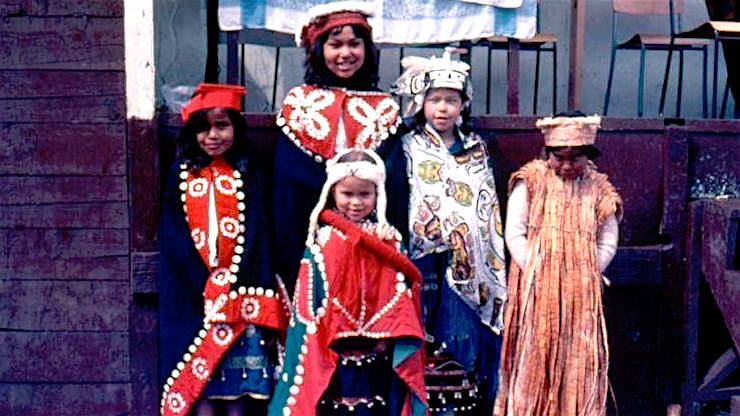
“In our language we say bak̓wam, and that means us, First Nations people,” says her sister Andrea Cranmer. “Every film Barb ever made spoke with a bak̓wam voice. Her films allowed our people to tell their own stories. They built bridges, between First Nations and with the wider world.”
“Barb was a total pioneer,” says Andrea, “a First Nations woman who had to battle with corporations and funders who had no understanding of bak̓wam stories or First Nations perspectives. They’d try to tell how to make her films, but she never caved. And the cool thing is: she succeeded. She stayed true to her vision. She got it done — and her films inspired people.”
The Cranmer family was always involved somehow in Barb’s projects, says Andrea. “If we weren’t actually in the films, then we’d be helping out behind the scenes. Lots of times, I’d have crew people staying in my spare room, and our dad would always host a feast for the visiting crew. We love to barbeque fish on an open fire so it was just the natural thing to do.”
Reaching beyond the frame
Teresa Marshall, a long-time friend and ally, attended many such feasts over the years. “That was Barb’s life’s work — to bring people together in a new cultural understanding and sharing,” says Marshall. “Whether she was making films, organizing healing camps on the land, or starting music festivals, she was a powerful and unifying force.”
“She came from a family of leaders, strong people, and she knew herself as part of that ongoing force,” says Teresa. “Her films always extend beyond the frame. They encompass untold millennia of cultural history — and at the same time they reach forward to share a window onto ‘Na̱mg̱is culture with future generations.”
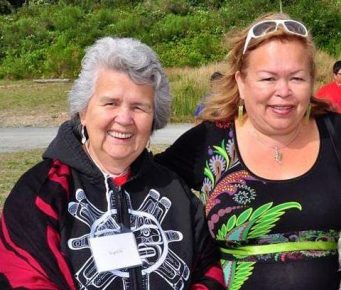
Barb Cranmer’s work addressed multiple and diverse aspects of Indigenous history and experience: traditional salmon harvesting; the central place of eulachon oil in her people’s culture and economy; the rebuilding of the ‘Na̱mg̱is Nation Big House following a devastating arsonist attack; the revival of Chilkat weaving; the impact of residential schooling and more. Her films circulated around the globe, screening at Sundance, the American Indian Film Festival and other international venues, bringing home numerous awards.
“Every film she made had a political aspect”
While invariably respectful and generous with the people she represented in her work, Cranmer never shied away from challenging Canada’s internal colonialism, and was keenly tuned to the broader political forces that play out across First Nations communities.
“Every film she made had a political aspect, and that was clear from the beginning,” says producer Cari Green, who co-founded Nimpkish Wind Productions with Barb in 1994, kicking off a long and fruitful collaboration. Barb’s first film with the company was Laxwesa Wa: Strength of the River, a richly informative documentary about the Pacific Indigenous fishery that had its broadcast premiere on the Discovery Channel.
“Barb was looking at a complex and functional fishery, one that was deeply rooted in her people’s cultural and spiritual practices, and showing how it was almost eradicated by an outside corporate structure. She was able to tackle big issues like that, to personalize them and bring them back to the level of community and family.”
“I believe in the importance of Indigenous filmmakers telling their own stories, and that was key to our founding the company and working together,” says Green. “We were not only colleagues and business partners: we became friends and family. My family attended her family’s potlatches, and her family visited with ours when they were in Vancouver. I will do whatever I can to ensure the public is made aware of the significant legacy that Barb Cranmer has left us”.
2019 Impact Award
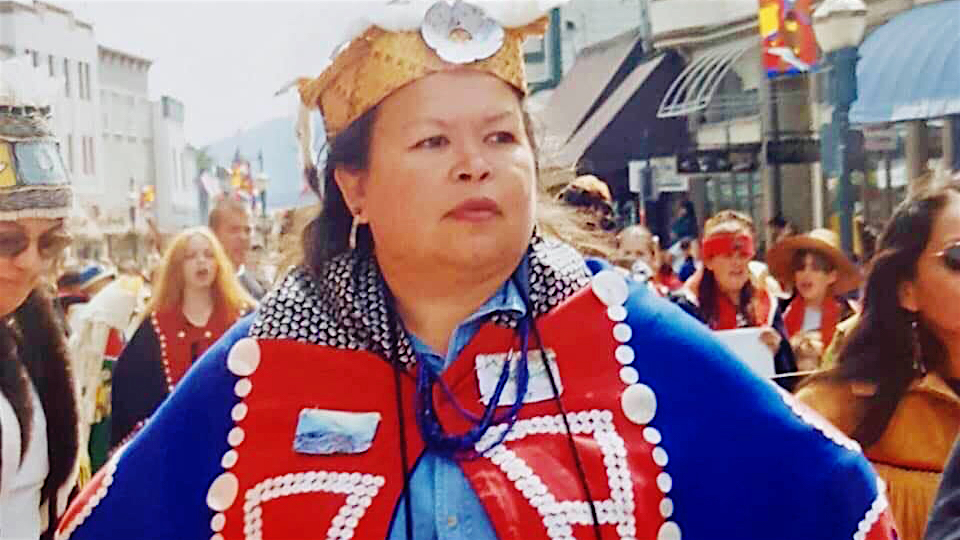
On July 2, Barb Cranmer was honoured at the Spotlight Award Gala, an annual event hosted by Women in Film and Television Vancouver, where she was posthumously given the UBCP/ACTRA Impact Award in recognition of a pioneering body of work.
Andrea accepted the award for her sister: “Her legacy will flow forever,” she said. “You will never forget her, and you will never forget us.” Andrea was joined onstage by a dozen members of the Cranmer family, including Barb’s mother Vera Newman, step-dad Edwin Newman and sister Donna Cranmer, while her father Roy Cranmer and sister Norinne followed proceedings online from home.
Remembering Barb in Yuquot
Two weeks later Barb Cranmer’s memory was evoked again in Yuquot, a small settlement on the southern tip of Nootka Island, where the Mowachaht/Muchalaht First Nation was hosting a 25th anniversary screening of The Washing of Tears as part of their Yuquot Spirit Summerfest, an event that brings hundreds of former residents back to the site of their ancestral home.
Directed by anthropologist Hugh Brody and produced by Gillian Darling Kovanic and Cari Green, The Washing of Tears tells the story of the Mowachaht/Muchalaht, most of whom were forcibly relocated during the 1960s, and their efforts to track down their whaling shrine, a set of ceremonial objects taken from them in 1903 and placed in New York’s Museum of Natural History. Released in 1994, the project would give Cranmer valuable early experience in large-scale documentary production — and she, as associate producer, would in turn prove indispensable to the production.
“Barb’s family had longstanding ties to the Mowachaht/Muchalaht people,” says Darling Kovanic. “Members of the community had attended her family’s potlatches over the years, so they knew and trusted her, and she became a very important presence on the production, involved throughout the process.”
Darling Kovanic and Green attended the recent screening in Yuquot, a remarkable event, held in a deconsecrated church that’s been refashioned as a Mowachaht/Muchalaht cultural centre, complete with the same totem poles that appear in the 1994 film. “It was an unforgettable experience, to see the film screened in that space,” says Darling Kovanic. “The group sang a traditional song in Barb’s memory, and Margarita James, the master of ceremonies, honoured her with a beautiful tribute, speaking of how proud they were of Barb’s achievements.”
The Washing of Tears, Hugh Brody, provided by the National Film Board of Canada
Released in 1994, The Washing of Tears was Barb Cranmer’s first collaboration with the Canada’s public producer. She went on to direct and co-produce two other films with the NFB: Laxwesa Wa – Strength of the River (1994) and Qatuwas: People Gathering Together (1995).
VIFF and Margaret Mead Festival Pay Tribute
A special screening of Barb Cranmer’s work will take place on September 15 at the Vancity Theatre during this year’s edition of the Vancouver International Film Festival. On the program is her final film Our Voices, Our Stories (2015), which featured survivors of Alert Bay’s St. Michael’s Indian Residential School; and Gwishalaayt: The Spirit Wraps Around You (2001), a beautifully crafted film on the Chilkat weaving traditions of the Northwest coast First Nations, an art form that Barb’s sister Donna Cranmer is helping to keep alive.
Later this fall the Margaret Mead Film Festival, which takes place from October 17 to 20 in New York City, will also be remembering Cranmer with an honorary screening of her work.
“We’re the Wonder Sisters”
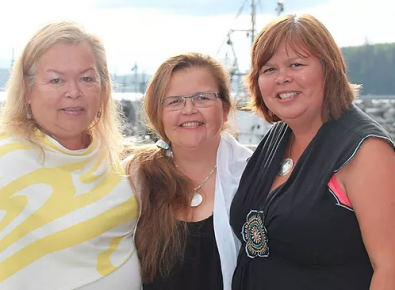
Cranmer packed a lot of living into her 59 years. A star athlete in her youth, superbly skilled in both soccer and basketball, she was renowned across the province for her powerful left hook on the court. Later she found time between films to serve on her local band council, launch language revitalization programs, organize healing camps, be actively involved in both the U’mista Cultural Society and T’sasala Cultural Group, and co-manage Culture Shock, an interactive First Nations-run art gallery and coffee shop that her sisters Andrea and Donna continue to operate in the heart of Alert Bay.
She took pleasure in good company and music — and loved to lip-synch, whether at family theme parties or at the cabaret nights that took place during Seafest, an annual event that Barb and her family helped to organize. She was a passionate blues fan, instrumental in bringing artists such as Eddy Clearwater to Alert Bay. Over the years she made several trips to Chicago to take in gigs by favourite musicians. On one memorable occasion Billy Branch and the Sons of the Blues interrupted their show in a crowded club to announce her presence: ‘Ladies and gentlemen, we have the ‘Na̱mg̱is princess with us tonight.’
This kind of thing happened all the time, says Andrea. Her sister rarely failed to make an impression. Shortly before Barb died, a ship from the Lindblad fleet was making a stop in Alert Bay and Andrea ran into a crew member, a woman who knew the Cranmers. “She hadn’t heard about Barb’s illness, and when I told her, she started to cry. But then she looked at me and said: ‘You’re the wonder sisters, you know. You are the glue that keep this village together.’ I went to see Barb at the hospital, and I told her. She smiled. She understood.”
Four days later Andrea and other family members were attending to Barb during her final hours. “She was crossing over to the spirit world,” says Andrea, and my mom was saying, ‘Just go with grace and ease, Barb, go with grace and ease.’ She was holding one hand and I was holding the other, and I said, ‘Be fearless, sis. You’re fearless. We’re the wonder sisters.’
They may have been the last words that Barb Cranmer heard.
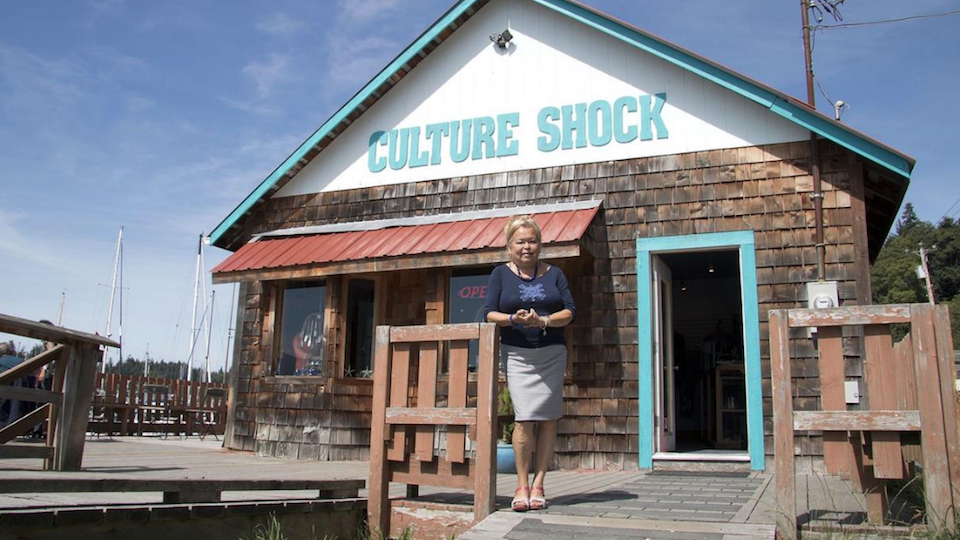
The Barbara Cranmer Indigenous Scholarship Film Fund
A legacy scholarship to support Indigenous women filmmakers is being established in Barbara Cranmer’s honour. Please contact BarbCranmer.LegacyFund@gmail.com to make contributions.
The films that Barb Cranmer made in collaboration with the NFB will soon be available for viewing at nfb.ca. Most of her other films are distributed by Moving Pictures.
Featured photo of Barb Cranmer: Amanda Laliberte photography.
